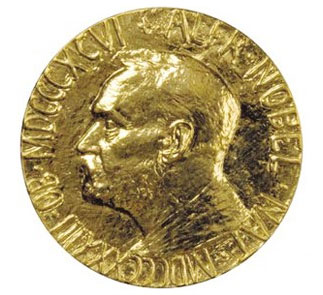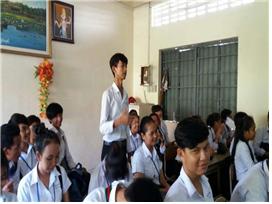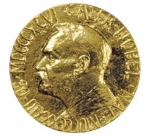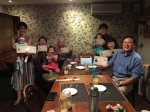WWCTU, Nomination for the Nobel Peace Prize for 2017
I, the undersigned Professor, Dr. Jung Joo Kim, support fully the following "Nomination for the Nobel Peace Prize for 2017"
Nomination for the Nobel Peace Prize for 2017
The undersigned hereby nominate THE INTERNATIONAL SOBRIETY AND TEMPERANCE MOVEMENT represented by the movement’s largest international organizations:
• IOGT International www.iogt.org
• International Blue Cross (IBC) www.ifbc.info
• The World Woman's Christian Temperance Union (WWCTU) www.wwctu.org
for the Nobel Peace Prize for 2017.
In November 2015, 193 member states adopted the UN's new sustainability goals. These are benchmarks for success in global development towards 2030. In achieving sustainability we believe the world community will also find easier solutions towards world peace. Damage caused by alcohol or drug use adversely affect many of the sustainability goals. Putting in place preventive measures and effective drug policies globally will be important steps towards reaching these important goals.
The international sobriety and temperance movement has since the mid-1800s been one of the largest popular movements in a host of countries. IOGT and WWCTU began in the
The movement points towards personal responsibility and towards the importance of a popular mobilization, while at the same time working politically for adoption of policies that will help to keep the consumption of alcohol and drugs at a low level. Research has shown what policies would effectively reduce consumption and thus damage. Such measures meet resistance, both because they allegedly restrict individual freedom and because there is a strong counterforce in the alcohol industry, an industry that has taken lessons from the mistakes of the tobacco industry and their lobbying against smoking regulations.
Without the political struggle of the temperance movement as advocates for children, women and the alcohol and drug addicted the use of regulatory tools would have been extremely difficult. We see this in the developing countries of our time where the alcohol industry is heavily into “fresh” markets, markets where a large portion of the population does not currently use much alcohol. WHO has on several occasions pointed to the importance of retaining the restrictive attitudes towards alcohol and drugs that we find in these countries if we are to ensure a continued positive global development.
Alcohol and drug use is a major risk factor for individual health and at the same time slows down sustainable development. WHO has estimated that nearly 3.3 million deaths occur globally each year due to harmful use of alcohol. Alcohol is along with physical inactivity, tobacco and malnutrition one of the four main risk factors when it comes to non-communicable diseases.
We are in this case concerned with “market created epidemics” that does severe damage to many developing countries, especially to the male populations in these countries. However, it is often women and children who are most affected. Problems caused by alcohol and drug use can keep generations of vulnerable individuals in a negative spiral of poverty, and they threaten human development. Globally alcohol is the greatest risk factor towards ill health and premature death in the age group 25-59 years, the age group that is most active in the workplace. Productivity loss due to alcohol consumption is great. Harmful alcohol and drug use effects sustainable development on many levels.
Alcohol is not the only cause of violence, but is often the factor that ignites the violence. There is a clear link between alcohol and violence in the home and in public places. We can see this link in research done in several countries and continents.
In
Alcohol is a factor in violence against children. In
As we have seen, use of alcohol and other drugs is a major threat to the world community’s sustainability goals and world peace. The work IOGT, IBC and WWCTU is doing is probably the most important effort in combating this threat today. A vibrant and popular temperance movement has proved to be vital in the implementation of measures to protect populations from damage caused by alcohol and drug use. They are also in the forefront to minimize damage already caused, and to help in reaching sustainability goals. Strongly opposing them we find big global corporations with their economic interests.
The organizations here nominated are represented in most countries and all three have built up solid international networks. They also participate in other networks and global processes together with organizations with similar goals. A Peace Prize for this work will focus world attention on the immense problems caused by alcohol and drugs and be an invaluable support for the idealistic opposition forces and the sobriety and temperance movement.
As mentioned above, I hereby sign to nominate IOGT, IBC, and WWCTU to receive the Nobel Prize for 2017.
Dr. Jung Joo Kim (Th.D. New Testament, '89 Harvard)




 댓글 0개
| 엮인글 0개
댓글 0개
| 엮인글 0개
-
- White Ribbon Bulletin
- 절제회 2017.07.17 17:08
-
- World Officers' Meeting in Korea, May 5 - 7, 2017
- World Officers' Meeting in Korea, May 5 - 7, 2017 On May 4, at KWCTU Hall, we welcomed with the worship service, the World Officers of the WWCTU, Mrs. Margaret Ostenstad, the World President, Mrs. Anne Bergen, the Executive Secretary, Mrs. Florence Wecther, the Recording Secretary, and Ms...
- 절제회 2017.05.17 16:54
-
- India News
- Rev. Jung Ha Won and Jung A Sohn in India
- 절제회 2017.07.12 13:35
-
- Cambodia WCTU News
- July 10, 2017Shalom!CWCTU gives thanks to you all, who are paying attentions to us and encourage us. We apologize that we are reporting about our activities of May and June together due to our busy schedule.On May 30 (Tuesday), 14:00, CWCTU visited Zaungre Middle and High School, giving our temperan...
- 절제회 2017.07.12 13:02
-
- Yonsei University YTC had a temperance campaign on Sondo Campus
- Yonsei University YTC had a temperance campaign on Sondo Campus, where the freshmen all gathered, staying in the dormitory. Sarah Oh, Hannah Oh, Michael Ko, and Wo Yun shared the KWCTU pamphlets and soft drinks with ballpoint pens with temperance message. Mrs. Hyun Kyung Kim, the KWCTU YTC Superi...
- 절제회 2017.06.14 14:02
-
- Cambodia WCTU News
- 절제회 2017.04.28 15:17
-
- NOMINATION TO THE NOBEL PEACE PRIZE 2017
- NOMINATION TO THE NOBEL PEACE PRIZE 2017
- 절제회 2017.03.06 17:20
-
- Vanuatu WCTU News
- The essence of the news is that after over 6 months' intensive spiritual warfare, the drinking bar, which had been opened next door to the church was closed by last month and its owner became a temperance member, her photo taken separately below. The Korean missionary Mrs. Nanjoo Kim, has worked ...
- 새소식 절제회 2017.03.06 17:15
-
- Cambodia Report
- The summer hot season has just started in Cambodia. I find myself already worrying how to endure the long hot weather which reaches up to 100℉. Last February 23, Cambodia WCTU had its regular meeting and special lecture. From 10 a.m. the vice president Mrs. Hyangsun Kim led the officers' inter...
- 절제회 2017.03.03 11:32
-
- Camobodia WCTU News
- Shalom! In the midst of critical political situations in Korea and the nuclear threat of the North Korea, we who live abroad also feel burdened. All the more we pray that WCTU members do our best where we are. Cambodia WCTU had Intercessory Prayer Meeting on January 31, 2017, from 10:00 a....
- 절제회 2017.02.06 17:35
-
- Norway's White Ribbon Bulletin
- Tobaccou IntroductionThe tobacco epidemic is one of the biggest public health threats the world has ever faced, killing around 6 million people a year. More than 5 million of those deaths are the result of direct tobacco use while more than 600 000 are the result of non-smokers being exposed t...
- 절제회 2017.02.10 12:38
-
- WWCTU, Nomination for the Nobel Peace Prize for 2017
- I, the undersigned Professor, Dr. Jung Joo Kim, support fully the following "Nomination for the Nobel Peace Prize for 2017" Nomination for the Nobel Peace Prize for 2017 The undersigned hereby nominate THE INTERNATIONAL SOBRIETY AND TEMPERANCE MOVEMENT represented by the movement’s largest int...
- 절제회 2017.01.28 16:26
-
- Cambodia WCTU News
- Dec. 28, 2016 Greetings to You! Cambodia WCTU sends our news after some time. Many things happened at CWCTU. First, there was a long vacation of schools. Then, as NGO, CWCTU was moved in the Government from Youth and Sports Department to Health and Social Service Department. We had to register...
- 절제회 2016.12.29 15:27
-
- The Testimony of Duck Ja Nam (Presented at the 2016 Ottawa World Convention)
- Hello, everyone! I feel so much privileged for this opportunity to speak in front of WWCTU members from all over the world. My name is Dukja Nam from Korea who is in charge of Home Protection Department for Korea Woman's Christian Temperance Union. Today, I want to share how the Lord saved a gir...
- 절제회 2016.09.23 16:04
-
- A Concert in Commemoration of the 150th Anniversary of the Martyrdom of Reverend Robert Jermain Thomas
- September 4th, 1866. It was a moonless light. On the General Sherman was Reverend Robert Jermain Thomas. It was his second time visiting Korea as part of his mission to spread the gospel in Korea. During this era, Koreans were extremely hostile towards Christians and it was dangerous to spread the g...
- 절제회 2016.09.09 17:14
-
- Fruits of the World Convention
- Duk-ja Nam, KWCTU member, registered to become a life member of the WCTU along with her children. The Cambodian branch of the WCTU have resumed their meetings, newly strengthened by the convention. Elizabeth, a member from the New Zealand team, was encouraged by the World convention to become the pr...
- 절제회 2016.09.09 17:00
-
- Yonsei University Christian Students Hold Camp at Temperance Hall
- Whilst the KWCTU were in Ottawa, Canada for the 40th World Convention, the Christian students of Yonsei University had their annual Yonsei Christians Conference Workshop from August 19th to 20th at the Temperance Hall. YTC representatives shared the temperance message along with the gospel to the st...
- 절제회 2016.09.09 16:38
-
- The 40th WWCTU World Convention in Ottawa, Canada
- 40th World Convention - "Preserving the Past... Reflecting the Present... Shaping the Future" was held in Ottawa, Canada from August 18 - 24, 2016The Fairmont Chateau Laurier was the venue for the convention which saw over 140 members from more than 24 countries meet to share reports, discuss busine...
- 절제회 2016.09.07 12:29
-
- Resolutions & CODE OF ETHICS
- World’s Woman’s Christian Temperance Union Triennial Convention, August 18 – 24, 2016 RESOLUTIONS ALCOHOL Whereas, alcohol is the most used drug of choice worldwide; and Whereas, alcohol is the world's third highest risk factor for disease; and Whereas, alcohol is a known carcinogen; and W...
- 새소식 절제회 2016.06.21 13:37
-
- RESIST GENDER IDEOLOGY!
- RESIST GENDER IDEOLOGY! UNITED APPEAL OF CHRISTIANSFROM THE THREE BRANCHES OF CHRISTENDOM) (December 15, 2014) God in His wisdom created people as the crown of His creation in the polarity of man and woman and for complementarity (Genesis 1:1, 26-27; 2:21-24). This is where fellowship is ref...
- 절제회 2016.06.13 12:49

 신고
신고 인쇄
인쇄 스크랩
스크랩













